Sarah's Key Blu-ray Movie
HomeSarah's Key Blu-ray Movie 
Elle s'appelait SarahStarz / Anchor Bay | 2010 | 111 min | Rated PG-13 | Nov 22, 2011
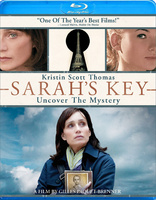
Price
List price:Amazon: $10.97 (Save 39%)
Third party: $10.97 (Save 39%)
Only 1 left in stock (more on the way).
Movie rating
7.6 | / 10 |
Blu-ray rating
| Users | 4.0 | |
| Reviewer | 4.5 | |
| Overall | 4.0 |
Overview
Sarah's Key (2010)
A tragic and shameful moment in French history continues to have consequences in the present day in this screen adaptation of the novel by Tatiana de Rosnay. Julia Jarmond is a nwriter from the US living in Paris with her husband, Bertrand, an architect who is restoring a block of apartments in Paris owned by his family. Julia learns that Bertrand's family obtained the building through less than honorable means; the original owners were Jews who were forced to sell in the wake of the Vel' d'Hiv Roundup in 1942, when the Nazi-affiliated Vichy government arrested over 13,000 Parisian Jews.
Starring: Kristin Scott Thomas, Mélusine Mayance, Niels Arestrup, Frédéric Pierrot, Michel DuchaussoyDirector: Gilles Paquet-Brenner
| Drama | Uncertain |
| Foreign | Uncertain |
Specifications
Video
Video codec: MPEG-4 AVC
Video resolution: 1080p
Aspect ratio: 2.35:1
Original aspect ratio: 2.39:1
Audio
English: DTS-HD Master Audio 5.1
Subtitles
English, English SDH, Spanish
Discs
25GB Blu-ray Disc
Single disc (1 BD)
Playback
Region A (B, C untested)
Review
Rating summary
| Movie | 4.5 | |
| Video | 4.5 | |
| Audio | 5.0 | |
| Extras | 4.0 | |
| Overall | 4.5 |
Sarah's Key Blu-ray Movie Review
The Burden of the Past, the Challenge of the Present
Reviewed by Michael Reuben November 21, 2011Note: The official running time of Sarah's Key, as listed on the Blu-ray case, at IMDb and everywhere else I could find, is 111 minutes. However, the actual running time of the disc is 102 minutes. As I did not see the film theatrically, I cannot compare the version on disc to what was shown in theaters, and, in any case, memory is not always a reliable source. As of the publication of this review, representatives of The Weinstein Company were attempting to establish the reason for this discrepancy, and this review will be updated with any additional information I receive. There's a resigned weariness you can readily spot in your conversation partner's eyes when you tell them that a film deals with the Holocaust. It's the equivalent of a groan that says, "Damn, I have to take it seriously, but it'll go down like medicine." If you pay attention, you can usually catch a fleeting glimpse of something else, hastily suppressed, because it's politically very incorrect, something you may even have felt yourself, because the thought has probably occurred to almost any filmgoer who's familiar with more than mainstream blockbusters of the past 30 years: "Another one?" After Shoah, The Sorrow and the Pity, Schindler's List, Life Is Beautiful, The Reader, The Pianist, The Counterfeiters and many more, is there really room -- or need -- for yet another cinematic depiction of the events of Nazi-led efforts to exterminate the Jewish race? These events have been recounted, catalogued, studied, routinely invoked as the ultimate avatar of human evil and, on the less positive side, exploited for shock value (as some accused Martin Scorsese of doing in Shutter Island). Can anyone possibly make another worthwhile cinematic contribution to the subject? (And let's leave aside the question of whether every contribution to date has been worthwhile.) As it turns out, the answer is yes. Sarah's Key, adapted from a novel by French author Tatiana De Rosnay, makes these events sharply, rawly vital in an entirely unexpected way by showing how what happened to a single Jewish family in Paris' Marais district continues to ripple forward in time, pushing and pulling at the lives of people who hadn't been born yet and may not even realize their connection to these past terrors. As we follow the inquiries of Kristin Scott Thomas' increasingly obsessed reporter trying to determine how her family came to own their apartment in the Marais, we're also shown, in overlapping storylines, the struggles of the Starzynski family after they were evicted from that same apartment in July 1942, when French authorities rounded up all the Jews in Paris for deportation. (Note that these were French authorities, not German, a point that this French film does not hesitate to stress.) The reporter's refusal to let the past lie challenges her colleagues, her family and ultimately the viewer with difficult questions: What is our obligation to the past? What responsibility do we owe to those who are dead and beyond our help? Should truths be revealed, no matter how painful and damaging to those around us? At one point, a grown-up parent with a settled home, a spouse and children is told that the entire ancestry on which that life has been founded was falsified. The experience is shattering. Was learning the truth worth upending the entirety of the life that preceded it? These are the quandaries that Sarah's Key asks us to consider.
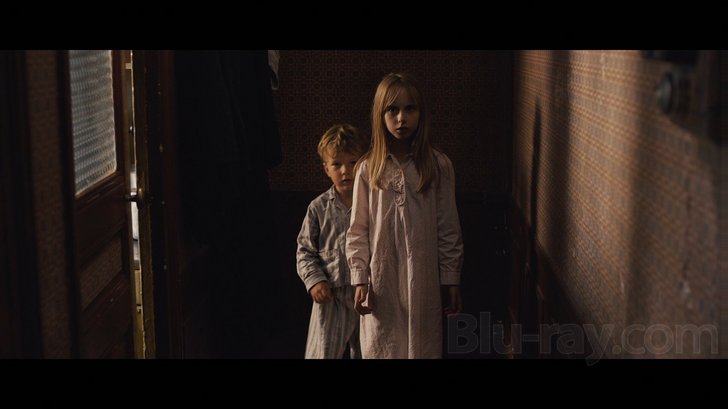
The film opens with two children laughing and playing, Sarah Starzynski (the astonishing Mélusine Mayance) and her younger brother, Michel (Paul Mercier). But the mood quickly changes. There's a loud, insistent knock at the door, and the French police order the children's mother, Mme. Starzynski (Natasha Mashkevich), to pack the essentials for a trip of several days. While the police grill her mother about the whereabouts of her husband and children, Sarah instinctively hides her brother in a closet with a bottle of water and tells him to be quiet; she'll come back for him. Sarah locks Michel securely in his hiding place, before she and her mother and father (Arben Bajraktaraj) are marched away with the rest of the district's Jewish inhabitants. Some of the Parisian residents taunt the terrified Jewish crowd being herded through the street by armed men. Others rebuke their neighbors, knowing that any of them could be next. As an elderly lady says when she's being interviewed nearly 50 years later, almost as if she's begging forgiveness: You must understand. We'd been told so many stories about the Jews. The destination for those arrested is the Vélodrome d'hiver, a stadium near the Eiffel Tower. In what would come to be known as the "Vel' d'Hiv Roundup", thousands of Jews were crammed into the stadium without sanitation, water, adequate food or medical facilities. Without dwelling at length on the horrors, the film is unsparing in its depiction. Today, as shown in the film's present-day sequences, the Vel' d'Hiv no longer exists; on its former site stands the French government's headquarters of the Ministry of the Interior. "The irony of history", observes Julia Jarmond, the reporter played by Kristin Scott Thomas. Those who survived the Vel' d'Hiv are transported to a so-called "transit camp" at Beaune-la- Rolande, outside Paris, from which they are eventually transported to Auschwitz. But throughout these events, Sarah remains single-minded in her determination to keep her promise to her little brother, and she takes enormous risks to hold onto the key to the closet where she hid him. When she falls ill from a fever, only to awaken after three days to find that her parents have been transported without her, Sarah's only thought is of escape. With the help of another girl named Rachel (Sarah Ber), and thanks to an encounter with a guard that is one of the film's many illustrations of how everyone has choices and can make a difference, even if they don't know what it will be, Sarah escapes into the French countryside. She will eventually come under the care of a farming couple, Jules and Geneviève Dufaure (Niels Arestrup and Dominique Frot), who will help Sarah and her key complete their return to Paris. What happens next is best left for the viewer to discover. Intercut with Sarah's frightening and suspenseful story is a superficially much more cheerful one set in the sleek, high-tech Paris of 2008. The reporter, Julia Jarmond, is an American who relocated to France after marrying a Parisian architect, Bertrand Tezac (Frédéric Pierrot). They have a teenage daughter, Zoé (Karina Hin), and Julia would like to have another child, but complications during her pregnancy with Zoé have made it difficult for her to conceive, despite all of modern medicine's most advanced procedures. Bertrand has not only accepted the limitation of his family to one child; he has embraced it. Julia writes for a small magazine that is struggling to stand out in a world of big competitors and increased pressure on print media. While everyone else covers the world financial crisis, she decides to write a historical piece on the Vel' d'Hiv Roundup, of which her younger colleagues aren't even aware. The research takes on a personal dimension when her husband shows Julia an apartment in the Marais that he plans to renovate for the two of them and Zoé. It's been in the Tezac family for years, and Julia is stricken with dread when she realizes they acquired the property in 1942, immediately after the Jewish residents were rounded up and removed to the Vel' d'Hiv. The apartment is, indeed, the same one where Sarah Starzynski lived with her family. Just as the key to the closet bound Sarah to her brother across a physical distance, so the apartment now binds Julia to Sarah across time as Julia begins her own single-minded inquiry into the apartment's history and the fate of its inhabitants. Julia's tenacious pursuit will put her at odds with her husband (with whom she already has marital issues), create rifts with her in-laws (who are guarding secrets, though not necessarily the ones Julia suspects), cause her to neglect her daughter and her job and, ultimately, send her to the U.S. and Italy to knock on doors, hoping to locate a Starzynski descendant. By the time Julia finds herself sitting across the table from a man named William Rainsferd (Aidan Quinn), who may or may not be in a position to answer her questions, she's no longer even sure what to ask. And to get there, Julia's made a lot of people unhappy. What does she hope to accomplish? As a co-worker asks her: What would you do if you actually found Sarah, alive, elderly and well? Give her back the apartment? To the extent the film offers any answer at all, it is suggested by Julia's voiceover at the beginning and especially the end, when Julia and a companion are watching a young child playing, oblivious to all of the momentous events that have preceded her birth and shaped the circumstances of her existence. We cannot change the past; we cannot determine the future; all we can do is respect those who went before by acknowledging their experience and telling the truth about them, however painful it may be -- and letting that truth be our guide as we try to make the right choices today.
Sarah's Key Blu-ray Movie, Video Quality 
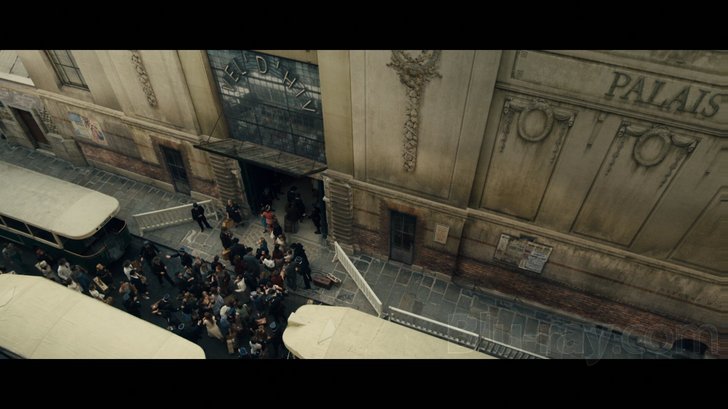
Sarah's Key was shot with the Red One digital system and finished on a digital intermediate. All the advantages of digital capture are evident in Anchor Bay's 1080p, AVC-encoded Blu-ray: superior detail, exceptional depth of field, excellent black levels, rich and saturated colors and absence of noise, grain or artifacts that can result from the process of transferring film to video (a process that digital capture makes unnecessary). Director Gilles Paquet-Brenner, his cinematographer Pascal Ridao and the technical crew created an effectively worn and understated period look for the 1942 scenes that would contrast noticeably, but not too sharply, with the contemporary scenes (which have more varied and brighter colors). The result is to make the shifts between time periods palpable without being jarring, as if the viewer were being thrown from one movie into another. It's a delicately calibrated process that the Blu-ray conveys beautifully.
Sarah's Key Blu-ray Movie, Audio Quality 
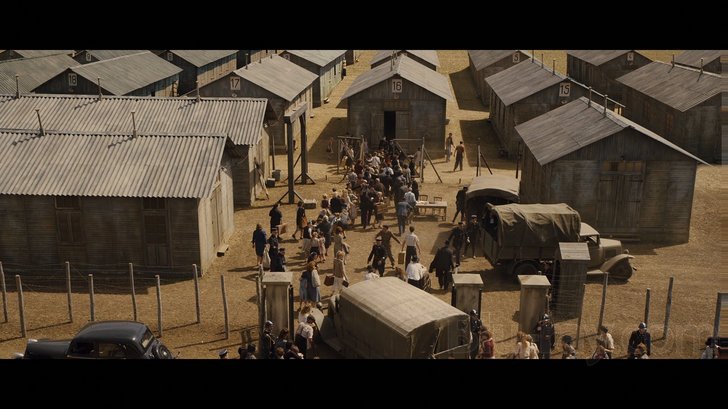
Unusual for a drama, the 5.1 soundtrack for Sarah's Key (presented in DTS lossless) makes extensive and aggressive use of the rear speakers, especially in the 1942 sequences, where the sound editing could be described as subjective and conceived from a child's point of view. The approach is announced at the very beginning, when Sarah and her little brother are playing in the bedroom and hear the knock of the French police at the front door. It erupts loudly from the left rear speaker, startling both the children and the viewer. (Later, in a present day scene, when Julia meets her husband at the apartment, Bertrand will announce his presence from the exact same sonic location, before he first appears on screen.) Sounds in crowds and in enclosed space containing masses of people enclose the listener aggressively. Even a simple ride in a train compartment becomes an experience of claustrophobia when several German officers enter to occupy the outer seats. Their voices move from the rear speakers, outside the door, to the front as they enter the frame, but they're never fully inside the compartment, always hovering in front of the screen, hemming in the figures (Sarah and others) seated within the compartment. Sounds in the present tends to be less aggressive and more atmospheric, although an early scene at Julia's workplace has her ever-present phone ringing loudly in the right rear. This foreshadows the increasingly important texts and phone calls that Julia will receive as her investigation intensifies, communications for which she will abandon even the most pressing and personal concerns without a moment's hesitation. The dialogue, which is always clear, is in English and French, and the disc defaults to English subtitles that translate only the latter. The wonderfully evocative score is by Max Richter, the German composer best known for Waltz with Bashir.
Sarah's Key Blu-ray Movie, Special Features and Extras 
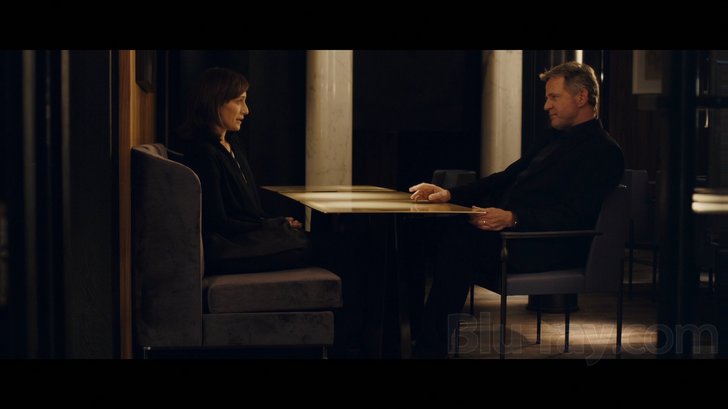
As with other Weinstein Company discs from Anchor Bay (e.g., The King's Speech), Anchor Bay has mastered this disc using BD-Java, while omitting the ability to set bookmarks -- a poor design that should be banished from Blu-ray.
- The Making of Sarah's Key (SD; 1.78:1, enhanced; 1:03:06): This is an
unusually
informative and absorbing documentary that begins with the novel and proceeds through
filming, although it unfortunately does not include any sections on post-production. Early
portions rely primarily on interviews, whereas later sections use substantial production
and rehearsal footage, much of it with the extras who filled out the scenes at the
recreation of Vel' d'Hiv or the transit camp. The interview subjects include:
- novelist Tatiana De Rosnay
- writer-director Gilles Paquet-Brenner
- producer Stéphane Marsil
- publishers Héloise d'Ormesson and Gilles Cohen Solal (who are a fascinating pair of characters)
- supervisor of special effects Antonin Seydoux
- production designer Françoise Dupertuis
- actor Niels Arestrup
- actor Arben Bajraktaraj (who at one point is so overcome with emotion as he speaks about his own family's history that he can barely continue the interview)
- Additional Trailers: At startup, the disc plays trailers, in standard definition, for The King's Speech and The Reader. These can be skipped with the top menu or chapter forward buttons and are not otherwise available once the disc loads.
Sarah's Key Blu-ray Movie, Overall Score and Recommendation 
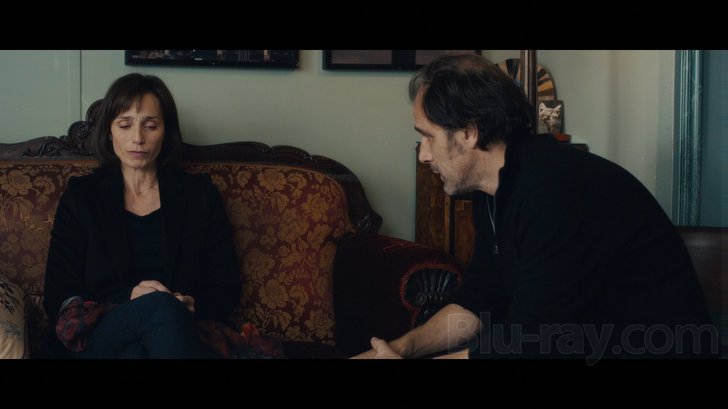
A common critical reaction when Sarah's Key was in theaters was to denigrate the film for spending so much time on Julia's story, because Sarah's is more important. This seems to me to miss the whole point of the film. It's a given that Sarah's story is important, but the film asks the essential question of how that importance can be made vital and present in the lives of people living now, as opposed to being tucked away in memorials -- even grand ones, like those that Julia tours -- where everyone can feel that the evils of the past have been tamed, denatured and locked for safekeeping. "When I think that this all happened right here in Paris in front of everyone, it's absolutely disgusting", says a younger editor in Julia's office, with the smug superiority of someone who's never had to challenge anything more threatening than a parking ticket. When Julia responds: "And how do you know what you'd have done?", the kid looks like she's been slapped. The cinematic recreation of atrocity has already been accomplished and brilliantly so. The cinematic exploration of how we, the comfortable ones, who think we're untouched by these events, but may suddenly find unexpected connections to them if we look closely enough (or someone else does), deal with such evils is just beginning.
Similar titles
Similar titles you might also like

Loveless
Нелюбовь / Nelyubov
2017

The Club
El Club
2015

Transit
2018

The Rules of the Game 4K
La règle du jeu / 1959 Reconstructed Version
1939

36th Precinct
36 quai des Orfèvres
2004

Roma
2018

Umberto D.
1952

Touki Bouki
1973

Timbuktu
2014

La Vie en Rose
La Môme / Warner Archive Collection
2007

Out 1
Out 1, noli me tangere
1971

La Marseillaise
The Marseillaise
1938

Bastards
Les Salauds / Slipcover in Original Pressing
2013

Children of Paradise
Les enfants du paradis
1945

The Image Book
Le livre d'image
2018

Betty Blue
37°2 le matin | Director's Cut
1986

Mandabi
1968

The 400 Blows
Les quatre cents coups
1959

Julieta
2016

Pioneer
Pionér
2013